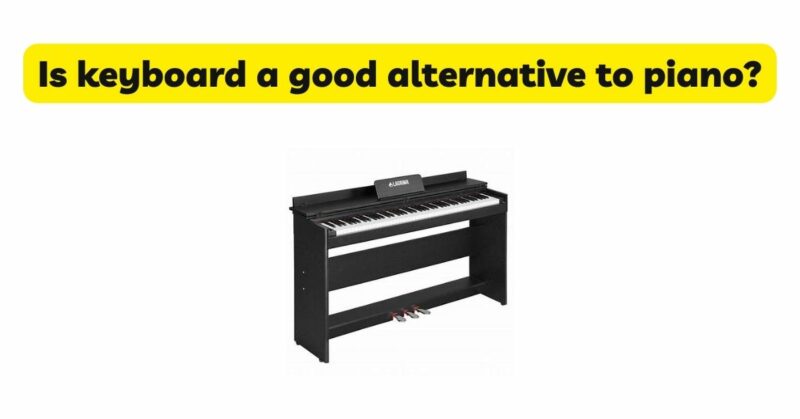The world of music offers a myriad of instruments to explore, and when it comes to choosing between a keyboard and a piano, many aspiring musicians wonder if the keyboard is a suitable alternative. In this article, we will delve into the advantages, versatility, and potential of the keyboard as a worthy substitute for the piano. By examining its unique characteristics, practicalities, and creative possibilities, we aim to provide insights that will help you appreciate the keyboard as a valuable instrument in its own right.
- Accessibility and Affordability: One of the significant advantages of the keyboard as an alternative to the piano is its accessibility and affordability. Keyboards are generally more accessible in terms of cost and space requirements compared to pianos. They are available in a wide range of prices, making them suitable for musicians with varying budgets. Moreover, keyboards are compact, lightweight, and portable, allowing for easy transportation and practice in different settings. This accessibility and affordability make the keyboard an attractive option for those seeking a convenient and cost-effective alternative to the piano.
- Versatility and Sound Options: The keyboard offers a remarkable level of versatility, making it a viable alternative to the piano. While the piano has a distinctive sound, keyboards provide a broad range of sounds and effects. They often come equipped with various instrument voices, including piano, strings, organ, synthesizer, and more. This versatility enables musicians to explore different genres, experiment with diverse styles, and even create unique compositions. Whether your musical interests lie in classical, pop, jazz, or electronic music, the keyboard opens up a world of sonic possibilities.
- Learning Fundamentals and Technique Development: Learning the fundamentals of music and developing proper technique are crucial aspects of musical education. While the piano provides an excellent foundation in these areas, keyboards offer comparable learning opportunities. Many keyboards now come with touch-sensitive keys and weighted or semi-weighted action, simulating the feel and response of an acoustic piano. This allows musicians to develop finger strength, control, and expressiveness. With dedicated practice and guidance, musicians can achieve a high level of technique on the keyboard, which can be further expanded to other keyboard-based instruments.
- Portability and Convenience: Portability and convenience are notable advantages of the keyboard as an alternative to the piano. Pianos, especially acoustic models, are large, heavy, and less portable. They require a dedicated space and professional assistance for relocation. In contrast, keyboards are compact, lightweight, and easily transportable. They can be taken to gigs, rehearsals, or even used for on-the-go practice. This portability enables musicians to perform in various settings, collaborate with other musicians, and explore different musical opportunities.
- Learning Resources and Technological Advancements: The keyboard benefits from the vast array of learning resources and technological advancements available today. Many keyboards offer built-in learning tools, tutorials, and interactive features designed to facilitate musical education. These resources provide step-by-step guidance, practice exercises, and real-time feedback. Additionally, keyboards often have connectivity options, allowing musicians to access online tutorials, digital sheet music libraries, and interactive learning platforms. These resources can enhance the learning experience, inspire creativity, and provide ongoing support for musicians at all skill levels.
- Performance and Recording Capabilities: The keyboard’s versatility extends to its performance and recording capabilities. Keyboards often have built-in accompaniment styles, rhythm patterns, and recording functions. This allows musicians to perform as a one-person band, with the ability to create full arrangements and accompany themselves. Furthermore, keyboards can be connected to audio interfaces or computer software, enabling musicians to record their compositions, produce music, or even engage in live performances using virtual instruments. These performance and recording features make the keyboard an appealing alternative for musicians interested in composition, arrangement, or music production.
- Collaborative Opportunities: The keyboard’s versatility and portability create ample opportunities for collaboration with other musicians. Keyboards can serve as the backbone of a band or ensemble, providing foundational harmonies, melodic lines, and various instrument sounds. Musicians can collaborate across different genres and musical styles, improvising and creating unique musical experiences together. The ability to connect keyboards to other instruments or devices expands the collaborative possibilities, fostering creativity and collective musical expression.
- The Keyboard as a Gateway Instrument: Another perspective on the keyboard as an alternative to the piano is to view it as a gateway instrument. Keyboard skills can be easily transferred to other keyboard-based instruments such as digital pianos, synthesizers, or even organ. By starting with the keyboard, musicians can develop a solid foundation in music theory, technique, and improvisation, which can be applied to other instruments in the future. This versatility allows musicians to explore different musical paths and adapt to diverse musical opportunities.
Conclusion: The keyboard, with its accessibility, affordability, versatility, and technological advancements, presents itself as a compelling alternative to the piano. Its diverse range of sounds, portability, and collaborative capabilities offer musicians unique creative possibilities. While the piano holds its own significance and charm, the keyboard stands as a worthy instrument in its own right, capable of providing a fulfilling musical journey. Whether you are a beginner or an experienced musician, embracing the keyboard opens doors to exploration, expression, and musical growth. Embrace the keyboard as an alternative, and embark on a musical adventure filled with endless possibilities.


